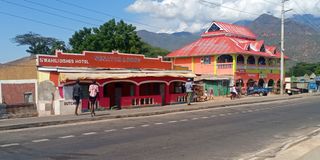Relative calm returns in Kainuk as guns go silent

Kainuk town along the border of Turkana and West Pokot counties. Residents are relieved that there has been relative calm lately.
When an elderly man was injured by armed bandits at a grazing field in Kainuk, near the Turkana-West Pokot border, in February, and all his 70 goats and sheep driven away, residents didn't anticipate that the incident would culminate in sustained bandit attacks.
Although all the animals were recovered by the police, as confirmed by Turkana County Commissioner Muthama Wambua, the isolated incident spoiled the peace that locals had enjoyed for three years.
Despite higher traffic on the rehabilitated Kapenguria-Lokichar road, daring bandits not only attacked herders but also shot at motorists at will, especially near the South Turkana National Reserve gate popularly known as KWS (referring to the Kenya Wildlife Service).
Other bandit attacks followed. Two herders were shot dead at a grazing field near the Kainuk bridge on February 12 and a Colombian female missionary and a driver were injured when their matatu heading to Kitale from Lodwar was attacked by bandits in the KWS area on March 17.
Fire exchange
Four bandits were killed on May 7 in a fierce fire exchange with police officers who were on a mission to recover livestock stolen from Seramach village in West Pokot.
Officers from the Kalemngorok Police Station who were on routine highway patrol on May 13 at KWS were attacked and one of them was injured.
Another ambush two days later saw the Kaakong assistant chief and two other people en route to Kainuk on a motorcycle injured, prompting the government to declare total war on bandits in the region.
Rift Valley Regional Commissioner Maalim Mohamed, during his visit to Kainuk on May 16, ordered herders who had established settlements in South Turkana National Reserve to leave and they complied.
"The settlements within the game reserve were harbouring bandits who were disguising themselves as herders and this explains why many highway attacks were happening in the KWS area,” Mr Wambua told the Nation.
“KWS officials and forest rangers are required to safeguard the gazetted area and coordinate the security team in case anyone forcefully returns."
He said attacks escalated because herders from the neighbouring Pokot community entered the wildlife sanctuary for pasture following a prolonged drought.
Relieved
Ms Mary Samal, a Kainuk resident, said there had been relative calm since the last incident was reported on May 24, when bandits stole livestock. They didn’t harm anyone in that attack.
"We hope that the situation remains the same so that we can freely engage in our normal activities like farming, trade, fetching firewood and traveling freely," Ms Samal said.
Turkana South MP aspirant Philip Aemun urged the national government to disarm people holding illegal guns, noting that long-lasting peace cannot be guaranteed if civilians are left with the weapons.
New Catholic Bishop
Meanwhile, Turkana South MP James Lomenen, County Speaker Ekitela Lokaale and woman representative aspirant Susan Aletia said they will bank on the newly installed Lodwar Catholic Bishop John Mbinda to strengthen peacebuilding structures on the border.
"The arrival of Mbinda in Turkana by road through Kainuk town that has been witnessing insecurity due to bandit attacks signalled a new dawn for peace in the region as he understands the region after working in West Pokot," Ms Aletia said.
She asked the new bishop to ensure that the department of justice and peace that has been implementing peace programmes remains vibrant to focus on advocating for the basic rights of innocent herders on the borders and their families who are killed by armed bandits.
Mr Lomenen was optimistic that the new bishop would fill the existing gap in efforts to eradicate banditry, by bringing leaders and the warring communities together for fruitful dialogue so as to create a conducive environment for development.





